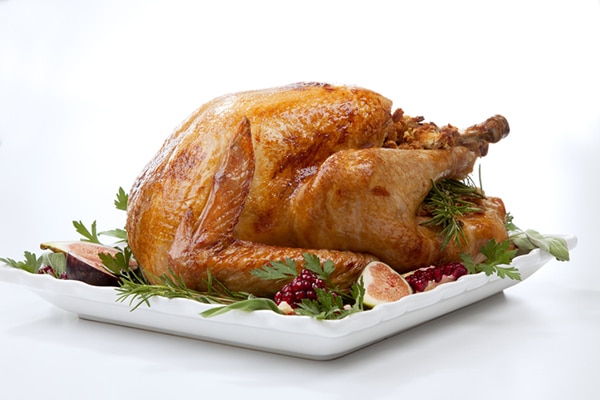It seems to make sense to wash foods before you cook or eat them. After all, it’s important to get rid of any pesticides or germs lurking on the surfaces.
And this seems like it would especially apply to turkey and other poultry because they are notorious sources of food poisoning.i
No less an authority than the late Julia Child said you should always wash poultry before cooking it.
But what does the science say?
Studies have found that up to 84% of chicken sold is contaminated with Campylobacter bacteria. It is responsible for nearly half of all cases of food poisoning in U.S.ii iii
Turkey did slightly better: up to 56% of samples had Campylobacter. The contamination rate for duck was 35%.iv v vi
Even worse, some of the study samples contained antibiotic-resistant bacteria strains. That means if you get infected, your illness will be hard to treat.vii
Never Wash Turkey
With poultry harboring so many bacteria, you’d think that rinsing off the bird before cooking would be a sensible practice. In fact, a survey found that 62% of cooks do this.viii
But researchers say the practice is risky. You should absolutely not wash raw poultry.
Some bacteria might get washed away. But there’s a good chance that you’ll spread germs to your sink, hands, and surfaces throughout your kitchen.ix
Scientists have found that while rinsing poultry in a sink, tiny droplets of contaminated water can travel two feet in any direction. You’ve now dramatically increased the risk of food poisoning for anyone who sets foot in your kitchen.
And during Thanksgiving you may have visiting friends and relatives who could end being exposed.
3 Steps to Protect Yourself from Turkey Bacteria
Take these three steps to minimize your exposure to the germs in turkey and other poultry:
- Buy a frozen—not fresh—turkey. A study by the Center for Science in the Public Interest found that fresh turkeys are more likely to contain Campylobacter.x
- When you buy a turkey, put the sealed package on a tray or other container in the very bottom of your refrigerator. That way any juices that may leak out can’t drip onto other foods.
- When you are ready to cook the thawed turkey, remove it from the packaging and place it directly into the cooking dish. Throw the packaging directly in the trash. Wash your hands immediately with soap before touching any surfaces.
- Cook turkey to an internal temperature of 165℉. That ensures all germs are killed. If you don’t have a food thermometer, cut the thickest section of the meat. Make sure the meat is steaming hot inside with no pink meat and clear juices.
Also, you should know that brining turkey will not kill bacteria. When you take the chicken out of the brine, carefully discard the liquid with the understanding that it contains bacteria from the bird.
One more thing…
We’ve always recommended buying organic pasture-raised, free-range poultry. It is free of harmful pesticides and chemicals.
There’s another good reason to buy organic…
The birds are raised without antibiotics. So they are less likely to harbor dangerous antibiotic-resistant bacteria.xi
Editor’s Note: Discover natural, non-drug methods to transform your health. Read our monthly journal, Independent Healing. It’s your best source for unbiased, evidence-based medical information. Get all the details HERE.
Related Articles
What Food Sell-By Dates Really Mean
Chicken Farm Swaps Dangerous Antibiotics for Surprising Natural Medicine

